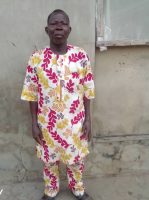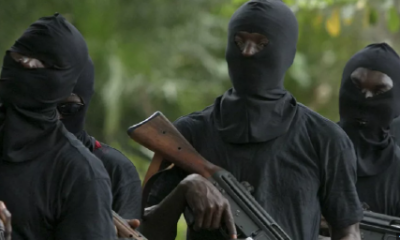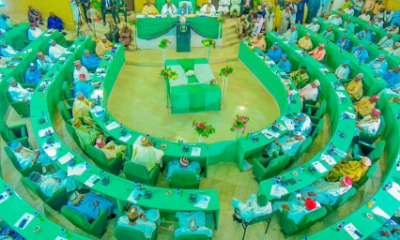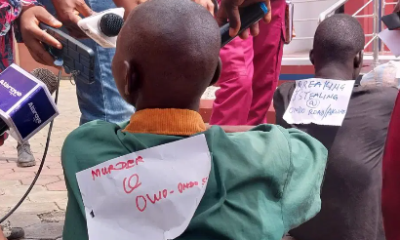Exclusive
IBARAPA: The Whirl before the Storm (1)
Published
5 years agoon
By
Editor
Because it fizzled out fast, the small war in Ibarapa seemed a trifle. Not at all.
By Segun Elijah
Adeagbo got off a motorcycle, and bustled down to a small shed standing by the roadside within earshot of the farming town’s only roundabout. The sun was gleaming down on the tarmac that Sunday afternoon. Not many would like to head for farm in such heat—supposing there was even a farm to go. The man then dashed for the shade. He garbled to himself as he took a seat adjacent to a bench where two other fairly old men, and two young ones, sat.
“We’ve made our decision. We don’t want Fulanis and Bororos in Igangan,” he said. “I’ve been around here long enough even their forefathers don’t have the courage to face me.”
He started rifling through a plastic bag heaving with sheets of paper and a bunch of celluloid materials.
“You’re in luck,” one of the men under the shed said. They called him for the interview. “That’s the man that will give you all you need.”
The man he referred to was Taiwo Adeagbo, the secretary to the Farmers Union in Ibarapaland. He’s better known as Akowe Agbe.
His eyes had a veneer of grey spread across, the pupils dimly staring behind almost shuttered eyelids when he looked at people. His forehead was creased up, revealing years and tolls of farming on a 69-year-old. Adeagbo had no imposing presence as a person: just about 5.5 feet tall, and lean flesh. A shrimp of a man. But when he spoke in his belligerent tone interlarded with bragging, almost to the point of appearing boorish, things began to heat up. The farmer, who had the responsibility to keep documents and records of his union’s effort to make good as a group, suddenly became a fighter.

Akowe Agbe
Adeagbo’s competence at his secretarial job was not in doubt. He obviously understood English, spoke a little of it, with a lot of code-switching to make himself clear. He also had enough brainpower to have documented incidents of Fulani herder-farmer crises across the southwest. These included eight incidents of kidnapping between Aug. 2019 and April 2020; 24 murders between September 2015 and January 2021. There were robberies, too. As of 2016, he had recorded 626 deaths related to Fulani herders’ violence. “With my own hands, I have buried between 40 and 50 farmers Fulani herdsmen killed in Igangan,” he said.
Adeagbo could also back his experience with troves of evidence. Some of them, on review, were not enough to establish Fulani herdsmen culpability in all the incidents he documented; others seemed way off; but most were so solid he had been confronting the head (seriki) of Fulani herders in Oyo, Abdulkadir Salihu, with it—in court, on radio, and television. Adeagbo also shared medical evidence with one Dr. Oyewumi who carried out autopsies and emergency treatment on victims.
Akowe Agbe took his documentary work seriously, with the precision a farmer as educated as Modern III (post-primary school in the 60s) could muster. And Sunday Adeyemo, the self-appointed defender of the Yoruba against invaders, relied on him for intelligence when he flustered Igangan’s Fulani community late January. Three people died in the rumble.
The crisis launched Adeagbo into sparring in the public space for the first time. “I have been preparing for this for 30 years,” he said. And the switch, from a farmer-scribe to Fulani herders’ nemesis, looked tricky—not really as it appeared.
Since Jan. 26, appearance had been deceptive at Igangan. Likewise in most of the six other towns in Ibarapaland, Oyo. Illusions of calm covered stewing grievances between the Fulani communities and their hosts, hiding impending explosion of hostilities—the tit-for-tat type.
That thin layer of peace even deceived the Western Nigeria Security Network Oyo Commandant retired Col. Olayanju Bisiriyu Olayinka. And he quickly sounded the horn Feb. 8.
“No security challenges observed in Ibarapa Central and North,” he said.
Most Ibarapa people would argue that.
“Since Seriki Fulani of Oyo Abdulkadir Salihu was chased out of Ibarapaland, there has been no peace,” Adeagbo said, referring to the January incident when the house and cars of the leader of the Fulani herders in the state were torched. It was the day a seven-day ultimatum Adeyemo gave him to quit Ibarapaland expired. It was the day peace was supposed to return to Igangan because Salihu, to the community, was the crime lord powering the three crises Adeagbo analysed as rocking the land: herder-farmer crisis, the Fulani banditry, and cattle rustling.
The farmer, however, insisted the volatile situation still had to do with Salihu, from his bolt-hole—in Kwara.
“He hasn’t left totally.”
“But he’s in Ilorin now.”
“Yes,” he agreed, and was about to reveal what strategy Salihu successfully pulled off to bite back. Then he had a call. Then another call. Then another.
One of the callers, a Yoruba man, was briefing him on the latest: an attack that took place Friday. A Fulani man was hacked to death in front of his family at Eruwa, Ibarapa East, a town 45 minutes’ drive from Igangan.
The killers of Alhaji Manu Dangote escaped, as criminals mostly did in Ibarapa where criminal attacks were now broadly pinned on the Fulanis.
But these killers were identified.
In spite of the Friday night murder, the Fulani leaders there kept proclaiming peace. Rekwua, the seriki Fulani of Eruwa whose name was Sulemana Mohammed, insisted Ibarapa East was not in crisis—as far as the Fulani-host community relations went.
“By the grace of God, we have no problem in Ibarapa East. We are moving about freely here,” said Mustapha Aliyu, the national PRO of Jami Natu Fulbe (JNF). He spoke for the seriki and nine others, mostly leaders of groups, including the Miyetti Allah, JNF, and Gan Allah Fulbe. They all sat on blue mats in a wooden shack at Eruwa new town junction Feb. 8 afternoon, planning.
“Dangote’s corpse is in mortuary, and we are planning to bury him.” said Aliyu. The late Fulani man was also a leader.

The impression of peace the spokesman projected was not just about turning the other cheek; it included coping with a ban on commercial activities in Fulani markets—karas— across Ibrapaland. The Fulani leaders and the traditional rulers of the host communities agreed to it. They believed the Fulani criminals holed up in the four karas in Ibarapaland. Aliyu said that shut-down had crippled livelihoods—not of the cattle sellers’ alone. The town Fulanis who sold petty things like ropes, foot-wears, cheese, and others in those karas, he said, were now down and out.
“Whatever happened, we have warned our people to take it as the will of God.”
Because Dangote’s murderers were Fulani, too, the incident would easily pass for an act of God. So they had to be calm.
Aliyu, however, kept emphasizing their anxiety. Adeyemo was still firing off quit ultimatums to Fulani communities all over the southwest. “We feared because he got support of the obas,” he said.
Their fear came to pass right the following Sunday, Feb. 9, at noon— about the time Adeagbo had the call in Igangan.
As soon as he ended his call, he announced to those sitting beside him: Eruwa is on fire; another person has been killed.
But he couldn’t confirm it.
No killing at Eruwa, he later learnt. But there was burning. The shed, where Aliyu, Rekwua, and others sat planning the funeral of Dangote some Fulani criminals killed two days before, had been smashed down.
“Can you see that?” Alhaji Bello, president of the Miyetti Allah, said. He sat in there with Aliyu and others on Saturday.
The violence even spread farther—to Okolo, a village some 10 minutes’ drive from Eruwa, along the Eruwa-Ibadan road. The kara located there, serving Eruwa, had been torched. Ashes and charred frames of stalls, shops stood all over the place. A company of two soldiers and three other security men manned a checkpoint in front of the market the following Monday.
The Fulani people and their organisations in Ibarapa East insisted they loved peace. All they could do, amidst their tribulation, was repine their double jeopardy: killing and kidnapping by their criminal tribesmen and the intimidation by the Adeyemos.
But the Eruwa incident on the evening of Feb. 8 triggered the Sunday violence, and worsened things for the Fulanis.
The Ogunlana brothers were coming from Ibadan to visit their mother, a widow, living at the Akintude/Dosumu area of Eruwa. It was around 6 pm when they got to Okolo in Gabriel’s blue Toyota Camry marked LSD309GJ. Their aged mother was already worried. And, truly, she had cause to: her two sons, fathers in their own families, drove through three to four standing points of danger along a lonely road imperiled by violent Fulani herders and Fulani bandits that evening.
“Gabriel, the younger, was the one driving when a shot rang out,” their mother, looking 70-something years old, narrated. She talked softly, mixing her yarn with mouthfuls of thanksgiving to God.
“It was a flat tyre,” the older one said he thought out loud while recapping the incident to their mother. Then more gun shots peppered their car.
“That was how they started springing out of the bush, shooting, first at the petrol tank, at a tyre, and, later, at them,” she said. But the two kept moving. “I didn’t know where the courage came from,” said Gabriel. “I just had it in my mind I shouldn’t stop.”
By the time he pulled up at Emma Fuelling Station, way out of danger, the car had been damaged: a leaky fuel tank, a flat tyre, and, at least, eight bullet holes.
Their mother said the armed men have been attacking people around that axis. Her son Gabriel shed more light on it. His attackers were kidnappers—and Fulani. “The probability of them being Fulani was associated to their mode of dress and observable physiques,” Gabriel said. The manager of the fuelling station where he parked the car told him the criminals had an informant along the route casing vehicles travelling on the road. “Their target is a car presumed to be exotic enough for a big ransom,” Gabriel said. He was certain those bandits purged from Igangan migrated to Eruwa and its fringes.

According to locals, Okolo itself was bombarded the night before. A troop of armed Fulani men stormed the village, and kidnapped a Togolese bone-bender —for a ransom. Similar instances of shooting and show of force around Ibarapaland confirmed ragtag groups of Fulani armed men now roamed the countryside. Major towns were no-go areas for them.
At Igangan, in Ibarapa North, Adeagbo said no Fulani, herdsmen or otherwise, could stay after the Jan. 26 incident. Even Eruwa, in Ibarapa East, where the likes of pacifist Aliyu lived on sufferance, was gradually sliding into chaos.
Same in Lanlante.
The group of Fulani here had not been attacked physically. But they lived in mental torment in a town they had called home for decades. Rumors of war, stories of Fulani herders and bandit’ attacks, and rhetoric of aggression the Adeyemo footmen, mostly youth, were spreading unsettled them. The Fulani community had to keep down their heads. Their faces lit up when they heard the possibility of peace, but blanched when prompted to talk.
Mutual suspicion, hostility, and fear hanged thick in the air
The Lanlate Renaissance Group, for instance, had been more outspoken among those keeping the matter hot, especially in the media. The group appeared a phantom, though its leaders insisted it had a face. Series of enquiries, including from a former local government chairman living down the town’s main road, couldn’t establish an association like that. Its Jan. 24 lengthy press release however wigged Oyo Gov. Seyi Makinde, IGP Mohammed Adamu, and “a centre in comatose”—all shielding killer herdsmen in Ibarapaland. The statement, signed by its executive secretary Abimbola Adeyeri, also praised Adeyemo as the people’s hero filling the vacuum—something nature hates.
LAREG was formed last September by Adeyeri, a graduate of the Obafemi Awolowo University, Ife, Osun. He lived and worked out of town. In crisis, it is natural for groups like his to spring up, and defend their interests, mostly with rhetoric. For the interview, the group’s spokesman preferred hiding his identity—for security purposes. But he frankly said all Fulani people shouldn’t be tarred with a broad brush. He had seen Fulani herders wielding swords, daggers, machetes, and guns—not AK-47. He had been involved in instances where the herders in questions showed a human face, and amicably compensated for destroying his farm. Leaders in town held such moderate views, too. On the face of it, Lanlate wasn’t about to evict its Fulani squatters who weren’t as many as those sent packing from Igangan. “But the fact is every Fulani community in Ibarapaland harbors some criminal elements,” he said.
JNF’s spokesman Aliyu said they arrested and handed over to police more than 25 of these elements in Ibarapa East last year. The most notorious of them was one Suleiman Mohammed whose accomplice was one Abdulahi. Adeagbo mentioned another Kazeem surnamed Sule, a kidnapper and ally of Salihu. There were the Umoru three, too—armed robbers at Igana. The presence of these and other creeps triggered the suspicion that sparked up violence every time an attack happened.
Even if it was just a skinful, this bad blood flowing in Ibarapa East achieved one thing: it tainted the misinformation of peaceful co-existence and calm in Ibarapa making headlines in the media. The peace at Eruwa, Lanlate, Igbo Ora, Tapa, Idere, and Ayete was best described as slender.
Suffice it to say: Don’t expect peace soon in Ibarapaland.
“The reason is that….
You may like


Three Deeper Life Church members kidnapped in Ondo State


Hoodlums injure five Amotekun Operatives in Osun attacks


Kano Assembly passes bill establishing state-owned security corps


Amotekun detains 20-year-old for murder of 65-year-old woman over N3,000 dispute


Amotekun foils 5 kidnap attempts, rescues 9 kidnap victims in Ondo


Ondo: Amotekun and Police comb forests for motorcycle theft suspects
Trending

 Entertainment6 days ago
Entertainment6 days agoSimi addresses resurfaced 2012 tweets amid online backlash

 Health5 days ago
Health5 days agoDeclassified CIA memo explored concealing mind-control drugs in vaccines

 Crime5 days ago
Crime5 days agoSenior police officers faces retirement after Disu’s appointment as acting IGP

 Education7 days ago
Education7 days agoPeter Obi urges JAMB to address registration challenges ahead of exams

 Health7 days ago
Health7 days agoNAFDAC issues alert on suspected revalidated SMA Gold infant formula

 Comments and Issues6 days ago
Comments and Issues6 days ago20 Critical Fixes to Save Nigeria’s Democracy from Electoral Fraud

 Football6 days ago
Football6 days agoMartínez ruled out of Everton clash with calf injury

 Latest6 days ago
Latest6 days agoICPC yet to respond to El-Rufai’s bail request as arraignment date looms

